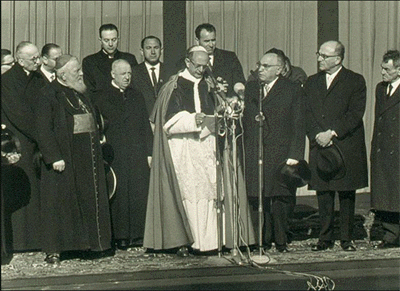- DialogikaDocuments and statementsThemes in Today's Dialogue
- News
- Members
- About
- Journal
- Meeting
January 5, 1964
 I am deeply touched, Your Excellency, by the deeply respectful and warm welcome that you have provided for me, by coming personally to meet me. I wish to express my gratitude, as well as my thanks for all of the solicitude which the [Israeli] authorities have shown in everything concerning my trip.
I am deeply touched, Your Excellency, by the deeply respectful and warm welcome that you have provided for me, by coming personally to meet me. I wish to express my gratitude, as well as my thanks for all of the solicitude which the [Israeli] authorities have shown in everything concerning my trip.
I would like these first words of mine to express all of the emotion that I feel, as I see with my own eyes, and tread upon with my own footsteps, this Land where the Patriarchs, our Fathers in faith, once walked ... this Land which for centuries rang with the voices of the Prophets, who spoke in the name of the God of Abraham, Isaac and Jacob ... this Land which, lastly and most importantly of all, was blessed and consecrated forever by the presence of Jesus Christ—blessed and consecrated for Christians and, we might say, for the whole human race.
As Your Excellency is aware, and as God Himself is my witness, I have not been guided in this visit by anything other than purely spiritual considerations. I have come as a pilgrim; I have come to venerate the Holy Places; I have come to pray.
From this Land, which is unique in the world because of the greatness of the events whose stage it has been, my humble plea rises up to God for all people, believers and non-believers alike, and I gladly include in this prayer the descendants of the "People of the Covenant," whose role in humanity's religious history could never be forgotten.
As a pilgrim of peace, I beg above all for the gift of reconciliation between human beings and God, and for that profound, true concord between individual human beings, and between peoples. May God see fit to hear my prayer-this God who, as the prophet proclaims, has "plans for [our] welfare and not disaster" (Jer 29:11).
May God see fit to pour out upon our tormented modern world this incomparable gift, whose echo rings out from every page of the Bible, and with which I am happy to sum up my greeting, my prayers and my wishes: Shalom! Shalom!